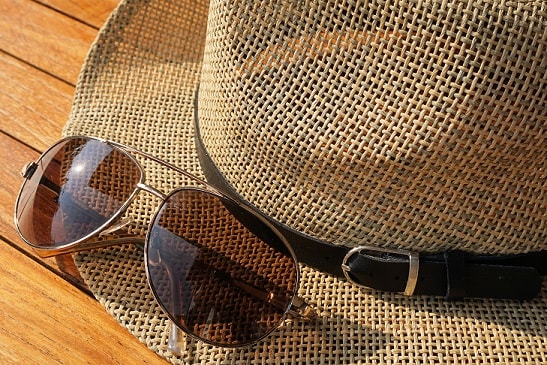It's almost summer, and time to start stocking up on the universal sunny-day accessory: sunglasses.
It might be tempting to grab a pair from your nearest dollar store and hit the beach. But if you do that, you probably won't be doing yourself — or your vision — any favors.
When you're outside in the sun without sunglasses, your eyes instinctively squint and your pupils constrict to limit the amount of light that can get in. When you put on a pair of tinted lenses, you fool your eyes into dilating, or staying more open. That lets a greater amount of UV light in, light that can ultimately be very damaging if the lenses do not have a built-in UV filter.
UV exposure from the sun has been shown to cause health problems, including sunburn of the eyes, cataracts, macular degeneration, and even certain types of skin cancer. Another condition called surfer's eye leads to bumps or growths on your eye or eyelids. It's believed to be caused by dry eye and exposure to sun, wind, and dust, all things surfers are likely to encounter.
And while cheap sunglasses may feel like they're helping, they could actually be making the problem worse. When your surroundings get darker — like walking into a dimly lit room, or slapping on those dollar shades — your pupils (the black dots in the middle of your eye) open wider to let in more light.
But if those sunglasses don't block UV radiation, your eyeballs are actually more exposed to the rays than they would be otherwise.
So what should you look for when shopping for a safe pair of sunglasses? For starters, ALWAYS choose shades that have 100 percent UVA/UVB protection. You should be able to see this info clearly labeled with a sticker or tag. The words "UV absorption up to 400 nm" should be there, too—that means you're fully covered. Also look for a line that states the sunglasses block 75-90 percent of visible light, to doubly ensure total protection.
Key factors when buying sunglasses include:
Polarization:
This cuts down on glare, an important factor when boating or driving.
UVA/UVB protection:
This blocks UV rays and prevents sun damage to your eyes and the delicate skin around them. The higher the better. Look for shades that promise UV protection of 99 to 100 percent. A UV 400 rating means the glasses block all UVA and UVB rays, too.
Optical quality
Poor quality lenses could cause eye strain if you wear them for several hours at a time. Also, lenses in cheap sunglasses often aren’t as impact-resistant as more expensive models. This is something to keep in mind, especially if you wear your sunglasses in any sort of environment where something could fly up into your eyes.
So, how do you know whether those cheap sunglasses are providing the UV protection you need?
Well, you should never assume anything from any labeling. If you want to be 100 percent sure, take the glasses to an optometrist. They will have a device known as a photometer, which can check the level of UV protection your sunglasses have in as little as 30 seconds. Make sure you keep your receipt and take those glasses back if they don’t pass the test.
Sources:
- Are cheap sunglasses bad for your eyes? By Amy Hellem
- Can Cheap Sunglasses Be Bad for Your Eyes? By TIME.com, Aug. 04, 2009
- The Scary Reason Cheap Sunglasses Are Terrible For Your Eye By Lisa Mulcahy, June 28, 2016
Make your appointment today
To make your appointment, simply give us a call (760)-948-3345 or
or
Due to COVID-19 safety protocols, all eyewear services are currently by appointment only. Please call to make an appointment.
At Golden Eye Optometry, we view good vision care as front line protection at every age. A routine eye exam can detect more than poor vision. It can shed early light on glaucoma, macular degeneration, cataracts and diabetes.